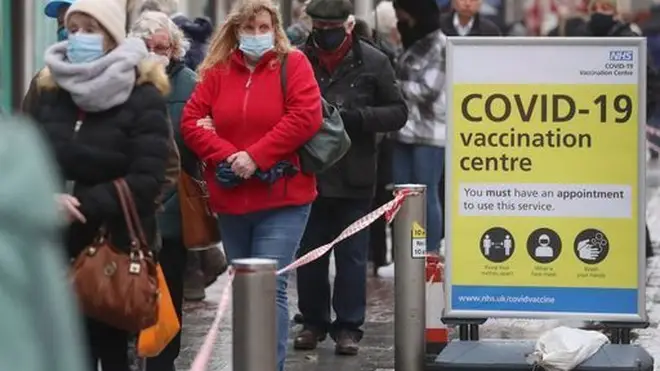
Nick Ferrari 7am - 10am
2 February 2021, 14:36

There has been a "worrying development" as a mutation has been detected in the Kent variant of Covid-19.
The mutation, known as E484K, is already present in both South African and Brazilian coronavirus variants.
Laboratory studies have shown that antibodies are less able to bind to a part of the virus known as the spike protein, in order to stop it from unlocking human cells to gain entry.
Vaccines currently in use should still work against the mutation, experts have said.
There is, however, concern that this change may reduce vaccine effectiveness. The UK has therefore increased measures to control the spread of new variants, and urgent testing is taking place.
Once vaccination is complete and there are significant levels of immunity across the population, the impact of mutations becomes much more diluted.
It is not uncommon for new variants to appear or change, as viruses mutate to make new copies of themselves to spread and thrive.
Initial results from Moderna suggest that its vaccine is still effective against variants with this mutation, although the body's immune response may not be as strong or prolonged.
Mutations may also make the virus more easy to transmit.
Even in the worst case scenario vaccines can be tweaked to be a better match in a short period of time, say scientists.

Professor Paul Hunter explains: Will Kent mutation evade immunity?
Dr Jonathan Stoye, group leader, Retrovirus-Host Interactions Laboratory at The Francis Crick Institute, said: "This suggests that the UK variant is now independently acquiring the E484K change.
"From a virological standpoint, appearance of new variants by mutation during replication cannot be considered surprising.
"Whether this change will provide significant growth advantages for the novel virus causing it to predominate remains to be seen."
Dr Julian Tang, honorary associate professor at the University of Leicester, described the finding as "a worrying development, though not entirely unexpected".
He said it is important that new cases of coronavirus are kept to a minimum to prevent opportunities for the virus to mutate further.
Prof Tang said that allowing spread could provide a "melting pot" for different emerging variants.He said: "We really need to reduce our contact rates to reduce the opportunities for viral spread (and) replication to reduce the speed with which these different virus variants can evolve."
Hancock says testing is now being boosted in Bristol and Liverpool after new variants have been found.
Yesterday 105 cases had been found in the UK as a whole. Today, Hancock said that 11 cases of the variant have been discovered in Bristol, and 32 in Liverpool.
Yesterday, the South African variant of coronavirus has been discovered in eight different areas of England where people had no clear travel links to South Africa.
Door-to-door testing is now being applied in affected areas.

'The South African variant is not a massive cause for concern'